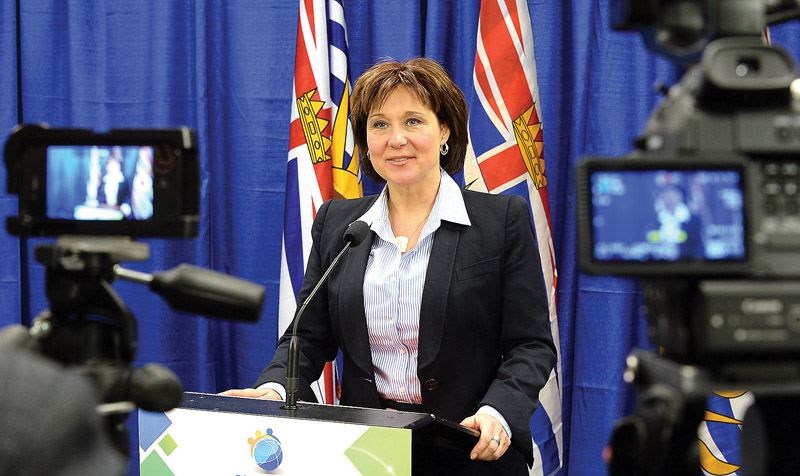The liquefied natural gas industry is still on course to underpin the provincial economy, said Premier Christy Clark. A spate of low commodity prices and public discussions about LNG companies having recent problems are the isolated bumps in a road that is long and is going to transport the province's budget, according to Clark who spoke as the Wednesday keynote luncheon guest at the BC Natural Resources Forum in Prince George.
"We are experiencing some unexpected changes, especially right now with oil prices," said Clark. "Thank goodness we are adaptable...although the script may change, I believe very much in the original goals for this industry. This is going to happen for our province."
While Alberta is in a public spotlight trying to mop up the provincial government's red ink, and even the federal government seems challenged to fiscally respond, all because global oil prices took a plunge, Clark said the B.C. economy was made of stronger stuff. She pointed out the healthy forestry sector, the stalwart mining sector and the already burgeoning natural gas sector as the reason there hasn't been a crude awakening for our provincial bottom line.
When asked why there had been 18 expressions of interest in B.C.'s natural gas industry but no company yet announced as going ahead with their project Clark responded that these projects are each worth hundreds of millions of dollars to the proponent companies so this stage was the final phase of their due diligence.
"Eighteen nibbles but no bites? I'd say a couple of billion dollars invested in B.C. by those companies already is a pretty big chew," she said.
Admittedly, she added, when the global oil prices tanked - natural gas is a commodity linked closely to the price of crude - she expected the long list of LNG proponents to back off from their plans. To her own surprise and inspiration, their interest in B.C. seemed to gather new momentum, she said, and that includes right up to events going on this week.
The proponent leading the way in many aspects of building a B.C. plan to ship LNG to Asia is Petronas. This company had been critical, in recent months, of the B.C. government's lack of tax and regulation protocols. This was holding up their calculations to the point they might drop their plans and move on to other natural gas sites around the world.
"They are currently working with their suppliers [on final viability numbers] but our part of that is now done," Clark said. "We have wrapped up our dealings with them, we provided what they were looking for, so now we are all just waiting for the answers they come back to us with."
There is no physical way all 18 inquiries into LNG projects can come to pass, she said, but the leading candidates are putting forward the kind of signs - consultations with First Nations, step-by-step satisfaction of environmental requirements, big money being spent on preparations, and close dialogue with appropriate officials - that a provincial government can be confident in.
"The proof will be in the pudding in February when we introduce our third consecutive balanced budget," said Clark. "We may be the only province in Canada this year that does, and we have done it without the big single wealth-source like Alberta has [with oil]. We have managed our finances well and responsibly," and LNG will be new investment and new provincial income on top of that diversity.
She stressed that no matter what the industry, it was the collected natural resources sector based in northern and eastern communities that provided the features of life - infrastructure and services - in the Lower Mainland. Evolution and modernization was needed across the board, she said, and foremost in that goal was First Nations relations, but the spirit of land-based industry was still the foreseeable future of B.C.



